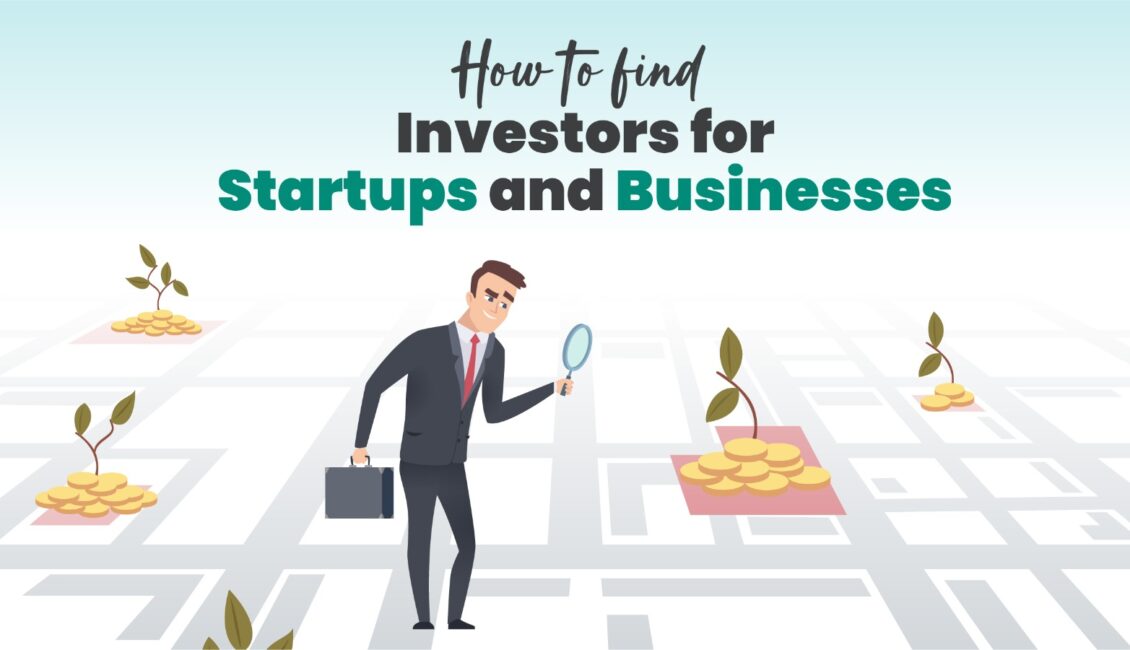
No startup journey is without its challenges. A startup will inevitably encounter them. Their challenges range from promoting their product to maintaining the stability of their organization. According to a source, cash flow and finance management rank as the fourth most common reasons for startup failure.
Finance is the building block of any startup. For a startup to get off the ground, raising funds is at the top of the to-do list. But how do you find investors to provide the necessary funding? We understand how tough it can be to find investors for startups. So, here we are with eight sources of financing for startups. Let’s get started!
How do you find Investors for Startups and Businesses?
Running a startup or established business requires the most funding. Funding is crucial during the initial stages of a startup. Therefore, it should be one of your focus areas. There are many business investment opportunities you can get from diverse sources.
But, before we talk in detail about ‘how to find investors,’ there are a few things you need to remember. It aids in understanding your financial requirements for pitching to investors, selecting the most suitable investor, and securing funding for startups. The following are a few questions you need to understand and find answers to.
- How much investment do you need?
- What amount of equity are you willing to give to investors?
- How do I pitch to investors?
- What type of decision-making control do you need in your startup?
- Is it the right time to raise funds?
- Do you have enough data and stats to create a marketable pitch deck?
Once you have good enough answers to the above questions, it is time to focus on what sources can provide funding for startups!
There are eight sources of funding available for startups and businesses.
The following are the most trusted sources to find investors for startups. Each has its perks and drawbacks. Let’s talk more to help you understand which suits your startup needs. Additionally, we have discussed a few startup investment strategies for each type for better decision-making.
1. Find Investors from Your Network.
When discussing raising funds for startups, most people assume it’s all about researching and reaching out to third parties, attending pitching events, and more. While these are important, one source most people often ignore is your network!
Your network refers to your personal and professional connections. You can connect with them to pitch your ideas and raise funds. Whether formal or informal, your pitch should benefit you and your connection.
Professional networking has more than one benefit. With professional networking, you can connect with experts and like-minded individuals, access valuable insights and feedback, and, most importantly, find investors for your startup. They can serve as your reference or provide positive words to help you secure the opportunity to pitch and raise funds.
2. Angel Investors
Angel investors are high-networth individuals (HNIs) willing to invest their money and knowledge to help a startup grow in return for equity rights or interest. These individuals have industry expertise and want to support innovation and growth.
However, it is common for angel investors to diversify their investments and may need more industry-specific knowledge. Therefore, it is up to you to determine whether you require a direct investment or one that comes with guidance.
You can connect with an angel investment network, like 21BY72, to find angel investors. The Angel Investor Hub arranges various networking and pitching events to help you find investors for your startup.
3. Venture Capital (VC)
A venture capital firm pools money from others and invests in startups. They generally guarantee a return to those they pool money from. The VCs frequently request significant control over startup operations and equity shares in exchange for the investment. They offer industry knowledge, guidance, and support to help you and your
startup succeed.
Look for venture capital firms in your area and ask if they have any pitching opportunities lined up. Prepare a thorough pitch with relevant information, stats, and graphs.
4. Startup Incubators
Running a startup is different from a regular business. Operating a startup is not a walk in the park. The initial stage of a startup is difficult, as 20% of startups fail within the first two years of incorporation (source). So, guidance in the initial stage can help you thrive in the startup world. Startup incubators provide training and support to new entrepreneurs in their early stages. It includes technical and administrative support. These organizations could be non-profit or for-profit incubators.
Consider the following factors when making your decision:
- The incubators have industry expertise
- Reputation of the startup incubator organization
- The incubators provided support
- Their charges (if applicable)
5. Startup Accelerators
Accelerators, as the name suggests, accelerate your growth. Startup accelerators are among the best sources. They do so because they provide an environment for startups to learn and grow in exchange for some equity rights.
They support all types of startups, particularly those in their early stages or those with a solid MVP and market presence. With them, you can gain valuable business knowledge and have numerous opportunities to pitch your startup to potential investors. You can also form business relationships with fellow team members and build a strong network.
Like startup incubators, you need to find an accelerator program that fits your business needs and is reputable. Compare the support and tools they offer as well as the equity share they demand, and make your final decision.
6. Corporate Investors
Established and successful businesses often invest in startups. They invest in innovative startups in their industry or diversify their business. They are known for their support in the form of strategy and resource sharing.
Follow the industry leaders and companies you admire. Keep an eye out if they are ever open to any business investment opportunity they are offering. You can also reach out to them for investment with a well-structured pitch.
7. Crowdfunding
Crowdfunding is a risk-free startup investment strategy. You need to select a public platform to promote your startup idea and raise funds from the public. It requires careful platform selection, effective marketing strategies to reach your audience, and a sales-worthy presentation of your startup brand image.
8. Government Grants
The government has started many campaigns to support local startups in Tier I, II, and III cities. They offer free-of-cost and interest grants to certain startups with significant social impact. The startup doesn’t need to worry about returning the grant money or offering equity.
These grants are highly competitive, so ensure that you present a perfect pitch for investment for your startup.
You may have noticed that pitching your startup is as important as finding the right funding source for a startup. Therefore, 21BY72 has provided a detailed guide on how to pitch to investors to increase the likelihood of securing funding; please take the time to read it! Check out our other blogs for more startup-related information and insights; stay tuned!
Conclusion
Investment is a vital part of building a startup. However, finding the right choice among the varied sources of funding can take time and effort. We discussed the top eight investment methods and how they can help you. If you need a safe investment with little to no equity sharing, you can opt for government grants, crowdfunding, and investing from a personal network.
Suppose you are willing to offer equity shares and control in business decisions. In that case, you can opt for other options like angel investors, venture capital, startup accelerators and incubators, and corporate funding. Each investment type has pros and cons; learn about them before choosing.
FAQ
1. How can I persuade investors to invest?
You need to present your startup in the best way possible. Create an informative pitch that highlights your startup idea, team members, market opportunities and demand, future trends in your industry and how you can benefit from them, your MVP (if applicable), sales figures, and your business model. Please keep it simple and authentic to build trust and impress the investors.
2. How do I choose the right investor for my startup?
When choosing the right investor, consider the amount of investment, the amount of equity they demand, the industry knowledge you’ll need, and the credibility of the investor.
3. How much equity should I offer to investors?
The amount should be a balance of the investment you need, the investor’s expertise, and your startup’s stage. Equity is crucial to decision-making power, so make your decision wisely after studying the market.









